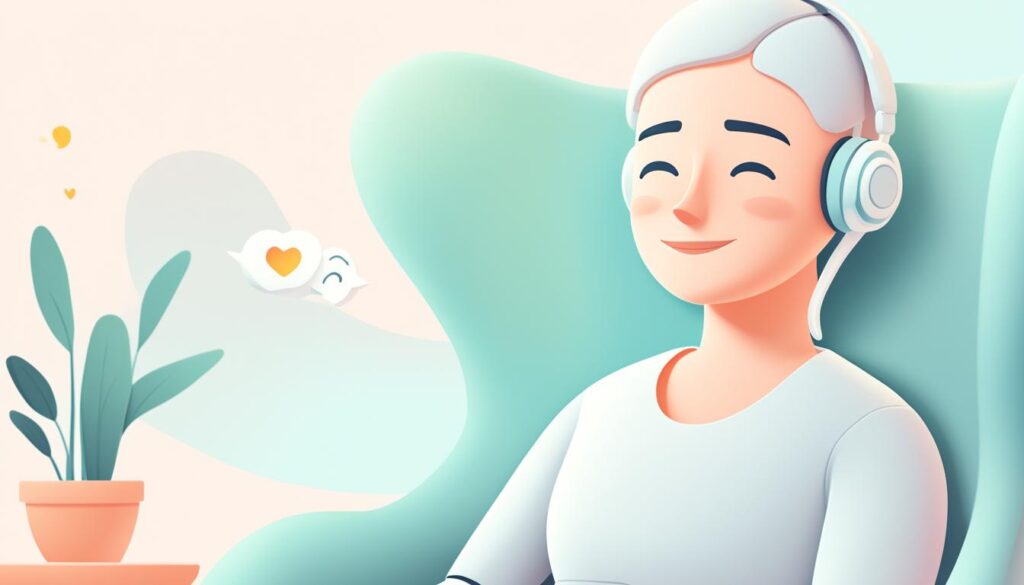Did you know that nearly 1 in 5 adults in the United States face mental health issues each year? AI therapy is now a key solution, offering support that’s easy to get and use. With Clare and Woebot Health leading the way, virtual therapy is always there for you, day or night. These digital therapists use advanced tech to meet your specific needs, aiming to improve your mental health.
Clare, backed by the European Regional Development Fund, keeps getting better at understanding and helping with your problems. Woebot Health also has an app that uses Cognitive Behavioral Therapy to help you right away. As technology meets mental health care, AI therapy is changing how we get emotional support. It’s making counseling easier and more accessible for everyone.
The Rise of AI Therapy
The world of mental health is changing fast, thanks to technology. More people know about mental health issues, so there’s a big need for good solutions. AI therapy is stepping up, making it easier to get help and offering new ways to support each other.
AI looks at lots of data to understand what each person needs. This new approach is changing how we think about mental health care. It’s making us take a more active role in our health.
Understanding the Intersection of Technology and Mental Health
A study in 2023 showed AI can spot mental health issues with 89% accuracy from just 28 questions. This shows AI therapy tools can use machine learning to predict and detect problems. AI chatbots like Woebot and Wysa are helping people feel better and connect with others for support.
These tools let people take charge of their mental health care. It’s a big step forward.
How AI is Transforming Support Accessibility
AI therapy makes it easier to get help. You can get advice and support right on your phone. About 38% of Americans have tried online therapy, showing more people are open to digital health solutions.
AI breaks down barriers, helping those in hard-to-reach areas get the help they need. It also frees up mental health workers to focus more on supporting their clients.
What is AI Therapy?
AI therapy is a new way to help with mental health, using advanced tech to support your wellness journey. It offers many tools to help people feel better. The main parts of AI therapy are always available help, making therapy more engaging with personal support, and using algorithms to improve how users and AI interact.
Defining AI Therapy and Its Core Functions
AI therapy uses data to improve mental health. It’s based on cognitive-behavioral therapy, offering support and therapy. It’s designed for you, making therapy more interactive and connecting. This means you get advice and tools to help you manage your health better.
A 2022 review showed AI therapy made therapy work better and reduced symptoms. This shows AI therapy’s big role in today’s mental health care.
The Role of Algorithms in Personalized Support
Algorithms are key in AI therapy for giving personalized support. They look at what you say to give you responses that match your feelings and habits. With tech like GPT-4, AI can talk with you in a way that feels real, helping you feel understood and supported.
Chatbots like Woebot use cognitive-behavioral therapy to help you anytime. They give advice that fits what you talk about. As mental health care changes, AI could make therapy easier to get and more engaging.

AI Therapy: Personalized Support for Your Mind and Wellbeing
AI therapy changes how we think about mental health by offering support that fits just for you. It uses technology to adjust conversations based on what you like. This means you get help that really understands your needs.
Thanks to advanced tech, AI therapy makes conversations better. It helps you connect more deeply and understand each other better.
Tailoring Conversations with Advanced Processes
AI companions use natural language processing to understand your feelings. They give you responses that match how you’re feeling, making conversations more empathetic. It’s like talking to a friend who really gets you.
AI therapy acts like a real conversation, making it easy to share your thoughts and feelings. This creates a safe space for you to open up.
Integrating Cognitive-Behavioral Therapy Techniques
AI therapy also uses cognitive-behavioral therapy to help you more. It offers strategies like mindfulness and relaxation to tackle your emotional challenges. These tools help you grow by giving you new ways to think and feel.
Using these strategies outside of therapy helps you on your path to better emotional health. It’s all about finding your own way to happiness and understanding.

The Benefits of AI-Driven Mental Health Companions
AI-driven mental health companions change the game in mental wellness. They’re always there for you, offering support any time you need it. Unlike traditional therapy, which has set hours, these tools are ready 24/7. This means you can get help right away, without waiting for an appointment.
These AI solutions also break down barriers to mental health care. Mental health issues affect nearly 10% of people worldwide. Many can’t get therapy because it’s too expensive or hard to reach. But AI companions are much cheaper, making mental health help available to more people. This includes those in remote areas or underserved communities.
AI companions don’t just offer support; they work well with traditional therapy too. They help you practice coping skills with things like mindfulness or cognitive-behavioral therapy. This way, they fill the gap between therapy sessions. By using AI for real-time support, you can improve your mental health. This lets human therapists focus on tougher cases while still helping those in need.
